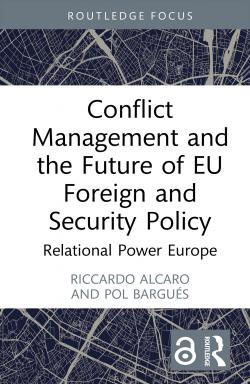Conflict Management and the Future of EU Foreign and Security Policy. Relational Power Europe

This book analyses how the European Union (EU) has dealt with crises and conflicts, including Russia’s invasion of Ukraine, Iran’s nuclear dispute and Syria’s civil war, to understand the peculiar nature of its role in international security. Rather than focusing on the institutional set-up of the EU’s foreign and security policy, the authors look at the ‘outer’ world, concentrating on crises and conflicts impinging on Europe’s security. They argue that the EU and its member states’ policies are constrained by systemic factors such as acute geopolitical rivalries and the fragmentation of regional governance systems, as well as by multi-source internal contestation of policies across member states. Hence, building on pragmatist-informed analysis they show that the EU’s actorness in international security is first and foremost constituted by interactions with its domestic and systemic context, and as such it should be understood as a ‘relational power’.
-
Details
London/New York, Routledge, January 2025, xi, 140 p. -
ISBN/ISSN/DOI:
978-1-032-90299-9; 978-1-032-99990-6 (pbk); 978-1-003-55946-7 (ebk); 10.4324/9781003559467
Acknowledgement
Introduction
1. The evolution of EU foreign and security policy discourse
2. Inside-out theories of EU foreign and security policy
3. An outside-in perspective of EU foreign and security policy
4. The strengths and limits of relational power Europe
5. The future(s) of relational power Europe
Conclusions
References
Index


